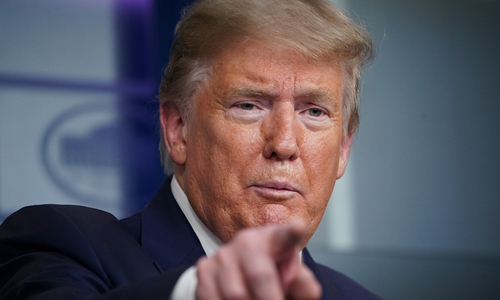Trump casts doubts on trade deal, though his advisors call for enforcement
By Zhang Dan Source:Global Times Published: 2020/5/9 16:12:12 Last Updated: 2020/5/9 19:47:08

US President Donald Trump. Photo: AFP
The US President Donald Trump casting doubt on the China-US trade deal serves his presidential reelection attempt; however, it contradicts his own trade officials who wanted to stabilize bilateral trade and save the US economy amid the coronavirus pandemic, noted Chinese trade experts.
Trump suggested that he could abandon the phase one trade deal inked with China less than four months ago, noting that he had "not decided" whether to maintain the deal.
"Look, I'm having a very hard time with China," Trump said in an interview with Fox News on Friday, adding he was "very torn" about the fate of the agreement.
The remarks came right after the phone call between China's Vice Premier Liu He and US Trade Representative Robert Lighthizer and Treasury Secretary Steven Mnuchin on the same day, with both sides vowing to create favorable conditions for the implementation of the trade deal, according to China's Ministry of Commerce.
"Both sides agreed that good progress is being made on creating the governmental infrastructures necessary to make the agreement a success," a statement by the Office of the US Trade Representative said.
Mnuchin and Lighthizer also dismissed any concerns that China's slow start in making purchases amid the coronavirus emergency earlier this year would force China to pull back on its commitments, the US media Politico reported.
As the coronavirus keeps wreaking havoc to the US economy, Lighthizer hopes to stabilize the China-US trade to create a better economic environment, in contrast to what Trump is thinking - his votes during the US presidential election, Mei Xinyu, a research fellow with the Chinese Academy of International Trade and Economic Cooperation under the Ministry of Commerce, told the Global Times on Saturday.
"As Trump mismanaged the coronavirus very badly in the US, he needs to hold the initiative to pass the buck to China at any time," Mei said, adding Trump's remarks were not surprising and drew the foreshadowing of blaming China continuously if the pandemic situation in the US worsens.
According to John Hopkins University, the COVID-19 confirmed cases in the US topped 1.28 million, with 77,180 deaths as of Saturday.
Gao Lingyun, an expert at the Chinese Academy of Social Sciences who advises the government on trade issues, echoed Mei, adding some US politicians are eager to garner votes by making remarks against China out of their self-interests instead of earning benefits for the US and its people.
Both defended that China has been striving to implement the phase one trade deal as much as it can since the agreement was reached, even during the virus outbreak in China.
In addition, Gao warned that the US might be unable to provide the products China needs as the coronavirus has constrained the supply capacity of agricultural products.
For example, the US meat shortage is pushing meat prices to unprecedented heights. Pork and beef prices in the US have shot up by as much as 20 percent compared to last year, according to a report by US agricultural lender CoBank.
A smooth implementation of the trade deal will be conducive to both countries' economies and fights against the virus, in Gao's words, to achieve "win-win."
"The US politicians should realize that the trade relations between China and the US should make a positive contribution to the battle against the coronavirus, instead of suppressing the trade relations in the name of coronavirus," said Bai Ming, deputy director of the Ministry of Commerce's International Market Research Institute.
As the bilateral tensions continue to elevate recently, China's trade with the US continued to drop from January to April with the total bilateral trade value down 12.8 percent to 958.46 billion yuan ($135.07 billion), official data showed.
To look further, Mei warned that bilateral relations would move to a turbulent and challenging time. "In the past, we aimed for solidarity while competing with each other, but now, we have to shift to coexistence while competing with each other and try not to break up."
Posted in: ECONOMY